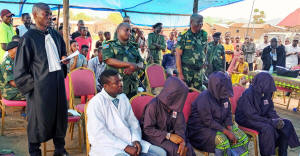Mobile court offers rare chance of justice for east Congo rape victims
 Send a link to a friend
Send a link to a friend
 [March 17, 2023]
By Crispin Kyala [March 17, 2023]
By Crispin Kyala
KAMANYOLA, Democratic Republic of Congo (Reuters) - A large crowd
gathered around the open sides of the makeshift courtroom in the eastern
Congolese village of Kamanyola in early March to watch the culmination
of a trial of 15 military officers for the rape of minors.
They watched in silence, some craning to see better, as a soldier
stripped the epaulettes off a colonel whom a judge had just ordered be
dishonourably discharged from the army and sentenced to seven years in
prison for raping a local 14-year-old girl last September.
"The fact that a very high-ranking officer has been sentenced is a very
eloquent message that no one is above the law," said Judge Innocent
Mayembe, who had found 12 of the soldiers guilty.
The Feb. 27 - March 9 trial by a mobile military court offered a rare
chance of justice for rape in conflict-hit eastern Democratic Republic
of Congo, where an estimated 40% of women have experienced sexual
violence in some form, according to a 2010 study in The Journal of the
American Medical Association.
During the trial, held in an open-air wooden structure, several victims
and one victim's father offered their testimonies in specially designed
hoods that obscured their faces - an indicator of the fear of stigma
that stops many from coming forward.

"I don't have any friends anymore," one of the victims said.
Holding the hearings in the local community helps "show people the need
to speak up about cases of sexual violence," said lawyer Armand Muhima,
whose organisation funded the trial. "The goal ... is to educate the
people so they know that the law is there for everyone."
Muhima works for the Panzi Foundation, an organisation set up by Nobel
prize-winning gynaecologist Denis Mukwege, who campaigns to help the
hundreds of thousands of women raped in eastern Congo since the region
plunged into conflict in the 1990s.
The Second Congo War, which killed millions of people, formally ended in
2002, but Congolese forces are still battling scores of armed groups in
eastern regions, fuelling the long-running sexual violence crisis.
[to top of second column]
|

Congolese victims of rape sit covered at
the military court where Armed Forces of the Democratic Republic of
the Congo (FARDC) suspects appear on their trial at a makeshift
courtroom in the village of Mangombe, Kamanyola in eastern
Democratic Republic of Congo March 9, 2023. REUTERS/Crispin
Kyalangalilwa

In a 2014 report on the fight against impunity for such crimes, the
U.N. Joint Human Rights Office in Congo (UNJHRO) said some progress
had been made.
But "most cases of sexual violence are never investigated or
prosecuted, and very few are even reported," it said.
The same year, the government launched an action plan to combat
sexual violence by members of the military under which hundreds of
commanders committed to report cases.
In 2022, 314 people in Congo, including 71 soldiers and 143 members
of armed groups, were convicted of offences related to human rights
violations and abuses such as sexual violence, according to UNJHRO,
which supported 12 investigations by military courts and seven
mobile court hearings.
The mobile courts, mostly funded by foreign donors, have been
operating in Congo for over a decade, bringing judges, prosecutors,
and defence lawyers to remote villages in an effort to show local
communities that crimes committed far from urban centres are not
beyond the reach of the law.
Even when cases are opened, the judicial process can be slow.
On Monday, NGO the Congolese Society For the Rule of Law asked
authorities in a statement why it had taken over a year to schedule
a trial for defendants in connection with the rape of over 100 women
and girls in a high-profile case from 2016.
The father of a victim at the Kamanyola trial said he just wanted
justice for his daughter.
"I need to see this case come to an end according to the law. I
don't ask for anything (else)," he said, speaking on condition of
anonymity.
(Additional reporting by Sonia Rolley; Writing by Alessandra
Prentice, Editing by Alexandra Hudson)
[© 2023 Thomson Reuters. All rights
reserved.]This material may not be published,
broadcast, rewritten or redistributed.
Thompson Reuters is solely responsible for this content.
 |